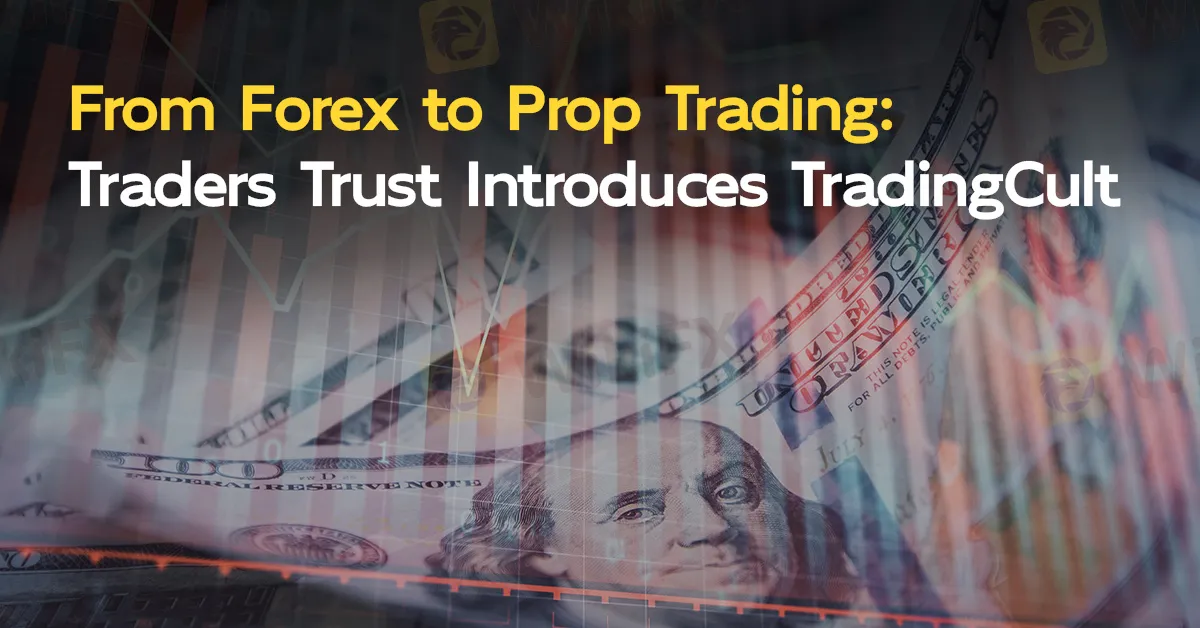简体中文
繁體中文
English
Pусский
日本語
ภาษาไทย
Tiếng Việt
Bahasa Indonesia
Español
हिन्दी
Filippiiniläinen
Français
Deutsch
Português
Türkçe
한국어
العربية
From Forex to Prop Trading: Traders Trust Introduces TradingCult
Abstract:Cyprus-based Traders Trust has joined the growing trend of forex and contracts for differences (CFDs) brokers entering the prop trading market. The retail broker has now launched its prop trading services under the new brand, TradingCult.

Traders Trust, a brokerage based in Cyprus, has entered the burgeoning prop trading market, following the trend among forex and contracts for differences (CFDs) brokers. According to Finance Magnates, the retail broker has introduced its prop trading services through a new brand named TradingCult.
Information on the TradingCult website indicates that this brand is managed by Seychelles-based Cultpedia and Cyprus-based Cultedge, separate entities from those handling the FX and CFDs brokerage of Traders Trust. Interestingly, TradingCult and Traders Trust operate out of the same office in Cyprus.


Significantly, Nicola Berardi, the Chief Executive of Traders Trust, is also the founder and CEO of TradingCult. Berardi, who formerly served as Chief Financial Officer of Saxo Bank and Synthesis Bank, created the Traders Trust brand in 2009 and has been at its helm ever since. As stated on the TradingCult website, Berardi is dedicated to offering traders the necessary funding, education, and support to achieve success in the financial markets. He highlights his mission to empower traders and ensure their ability to thrive.

Prior to Traders Trust's entry into the prop trading sector, established FX and CFDs brokerage firms like OANDA, Axi, Hantec Market, and IC Markets had already begun offering prop trading services. The increasing popularity of prop trading is encouraging more brokerage firms to venture into this growing industry.
TradingCult has introduced a notably competitive offering in the market. The new prop trading platform provides traders with a 95 percent profit split. Prospective traders can choose from four different challenges, with costs ranging from $99 to $999. The lowest-tier account features a funded balance of $10,000, while the highest tier offers a balance of $200,000.
Additionally, TradingCult utilizes the brokerage services of Traders Trust to provide trading on the MetaTrader 4 platform.

Disclaimer:
The views in this article only represent the author's personal views, and do not constitute investment advice on this platform. This platform does not guarantee the accuracy, completeness and timeliness of the information in the article, and will not be liable for any loss caused by the use of or reliance on the information in the article.
Read more

The Ultimate Guide to Automated Forex Trading in 2025
Modern markets are revolutionized by automated trading systems, which now execute 70-85% of all transactions. These advanced automated trading software solutions, commonly called trading robots or Expert Advisors (EAs), leverage algorithmic precision for automatic trading across forex, stocks, and commodities 24/7. By removing emotional interference and executing trades in microseconds, auto forex trading platforms create fair opportunities for all market participants. For those new to automated trading for beginners, these systems provide disciplined, backtested strategies while significantly reducing manual effort.

Will natural disasters have an impact on the forex market?
The forex market is known for its rapid responses to global events, but the influence of natural disasters, such as earthquakes and typhoons, can be less straightforward. While headlines may scream about catastrophic damage and economic disruption, the long-term effects on currency values often depend on a blend of immediate shock and underlying economic fundamentals.

Philippines Deports 29 Indonesians Linked to Online Scam Syndicate in Manila
Online scam groups in the Philippines trick Filipinos into gambling and love scams, from Manila to Bacolod, causing trafficking and pain as police fight back.

Why does your mood hinder you from getting the maximum return from an investment?
Investment decisions are rarely made in a vacuum. Aside from the objective data and market trends, our emotions—and our overall mood—play a crucial role in shaping our financial outcomes. Whether you’re feeling overconfident after a win or anxious after a loss, these emotional states can skew your decision-making process, ultimately affecting your investment returns.
WikiFX Broker
Latest News
How Crypto Trading Transforms FX and CFD Brokerage Industry
UK would not hesitate to retaliate against US tariffs - No 10 sources
FCA Warns Against 10 Unlicensed or Clone Firms
CySEC Warns Against 14 Unlicensed Investment Websites
Top Currency Pairs to Watch for Profit This Week - March 31, 2025
Will natural disasters have an impact on the forex market?
Philippines Deports 29 Indonesians Linked to Online Scam Syndicate in Manila
Navigating the Intersection of Forex Markets, AI Technology, and Fintech
Exposed: Deceptive World of Fake Trading Gurus – Don’t Get Fooled!
AI-Powered Strategies to Improve Profits in Forex Trading
Currency Calculator







